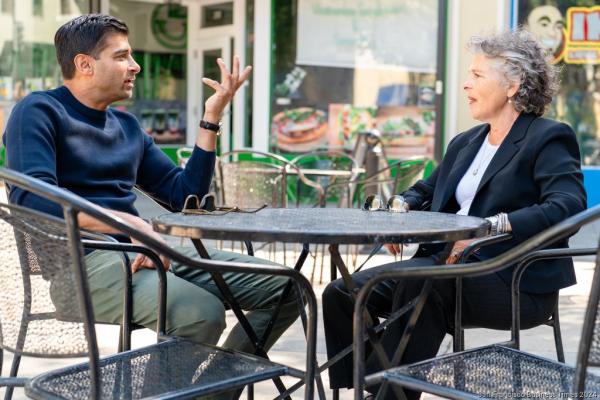News & Awards.
including honors for “Best Mixed Use,”
“Best Office,” and “Best Historic Rehabilitation”.

It’s no secret that crime and perceptions of a lack of safety are contributing to rising vacancy rates and office market distress in Oakland. The concerns have caused some businesses and restaurants to depart the city, and deterred others from seeking space in Oakland altogether. Insiders blame crime fears for diminished foot traffic and vibrancy downtown, too.
Despite the challenges, Oakland's real estate community is taking matters into their own hands to redirect the narrative about the East Bay city, and reignite the demand that Oakland once had during tech-fueled boom times.
In the last year, the city has seen millions of dollars in investments from local business owners, landlords, developers, brokers and community members to enhance security downtown, clean up the streets and activate the neighborhoods —and they’re just getting started.
Business and property owners in the Uptown neighborhood are launching a new private partnership to enhance security, bring more people to the area and upgrade the city’s reputation.
“As frustrating as it is to deal with what’s going on here, and what you hear, I view it as a really good opportunity to roll up my sleeves with other people that are committed to try and show the community what Oakland can be,” said Isaac Abid, founder and managing partner at Lakeside Group.
Betting on Oakland
Even with help from the city, the Oakland Police Department and business improvement districts that rely on special assessment fees to fund local projects and services, the partnership's backers saw a need for more resources to deal with blight, public safety and the negative headlines around downtown Oakland.
But as the city faced a staggering budget deficit and staffing shortages, property and business owners in Uptown sought a different path.
Essex, TMG, Signature Development Group, Lakeside Group, Hanover, PG&E and Maple Tree and others joined to launch Northlake, a privately funded group that wants to change the narrative of Oakland through increased security and street cleaning as well as hosting events to activate the area, which spans from 20th to 27th on Broadway. The area has a high concentration of institutional capital and thousands of new apartment units that delivered during the city’s boom years, as well as PG&E and Kaiser headquarters.
Denise Pinkston, managing director of land use and policy at TMG, said by funding the program through private capital, Northlake could amplify existing resources, like the Uptown Downtown Oakland Community Benefit District’s ambassador program, which offers buddy escorts and street clean-ups.
"Public-private partnerships where the private sector can contribute what we do well, whether that is financial assistance, or design, creativity, urban placemaking assistance —we need to step it up so that we can maintain downtown Oakland as a successful, vibrant neighborhood as we continue to go through the current challenges to downtown's around the country," Pinkston said. "Everybody who cares about Oakland cares about downtown Oakland, and we're trying to figure out how to help, and how to support our retailers and small businesses."
The group is still in the planning process, but it plans to establish a budget and finish fundraising before officially launching in the last three months of the year.
“I’ve always felt like the city has all the potential, it has something very unique in its culture and community,” Abid said, who is a member of the group. “Very few cities of Oakland’s size export culture the way that Oakland does. So there’s something special here.”
They’re not the only ones investing in Oakland. The city’s four biggest companies — Clorox, Blue Shield, PG&E and Kaiser — pooled together $10 million in March to bolster security near their offices, provide buddy escorts for their employees and offer employee safety training.
A spokesperson for the companies told the Business Times that since their announcement in March, they have also launched a downtown "safe zone" with increased Oakland police patrols.
“We’ve received a lot of positive feedback from our employees about our collective security efforts and the impact it’s having on their sense of safety and security,” the spokesperson said. “We’re looking forward to continued partnership with the city and community leaders to support our goal of creating a safer, more prosperous Oakland for all.”
The Chamber of Commerce, the UDCBD, and the Downtown Partnership, a group created by the chamber, are all working to improve conditions downtown. Last year, the chamber and property and business owners helped to launch Safe City Connect — a network of individually-owned security cameras across the city meant to augment OPD’s surveillance to help deter crime and catch criminals.
The footage captured by these cameras goes into a central database that OPD can access in the event of a crime. The program is actively expanding, and the city already has dozens of cameras installed.
“Utilizing technology that’s available to us in the city of Oakland where we are resource constrained from OPD staffing levels, 911 staffing, etc. it seems like an obvious effort that the business community can be working on in conjunction with each other,” said Abid.
While increasing security presence and surveillance is an important of deterring crime, activating the streets and bringing people back to downtown is also important, Pinkston said. The Northlake initiative will feature "very sophisticated" efforts to create a lively, active atmosphere, like beautifying streets and creating pedestrian-only areas.
“Some of the country’s most prominent urbanists have said very clearly that if you want people to come back to downtown, you need to create a reason for them to come,“ Pinkston said.


